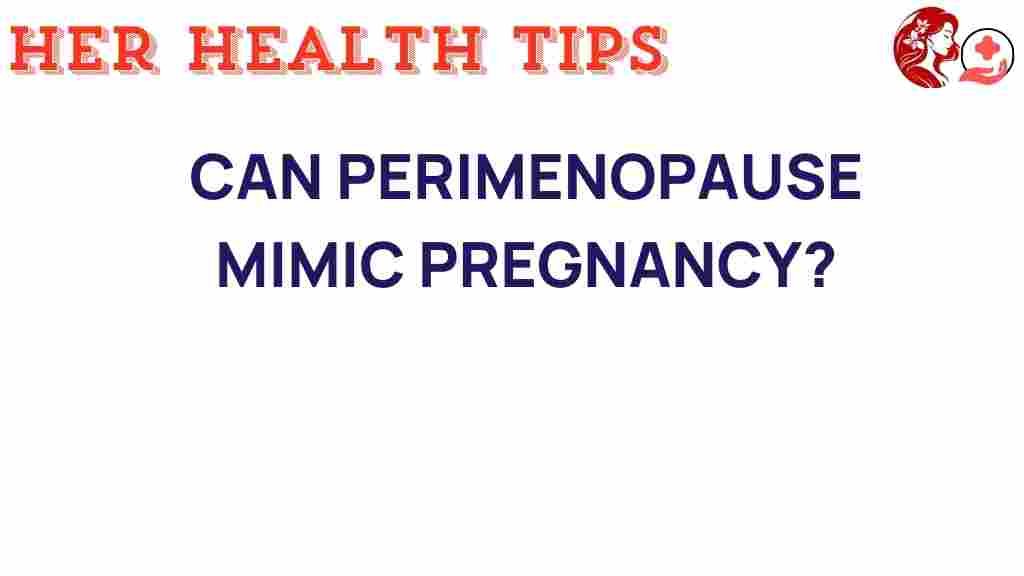The Surprising Similarities: Can Perimenopause Mimic Pregnancy?
Women’s health is a complex and often misunderstood topic, especially when it comes to the stages of life such as perimenopause and pregnancy. As women approach the end of their reproductive years, they experience a natural transition known as perimenopause, which can sometimes mimic pregnancy symptoms due to hormonal changes. Understanding these similarities is crucial for women navigating their reproductive health, as it can lead to better health awareness and informed decisions. This article will delve into the surprising similarities between perimenopause and pregnancy, exploring the symptoms, hormonal changes, and more.
Understanding Perimenopause and Pregnancy
To grasp how perimenopause can mimic pregnancy, it’s essential to understand both conditions. Perimenopause is the transitional phase leading up to menopause, often beginning in a woman’s 30s or 40s. It is characterized by fluctuating hormone levels, primarily estrogen and progesterone, leading to a variety of symptoms.
On the other hand, pregnancy is the period during which a fertilized egg develops into a fetus. This process also involves significant hormonal changes, including increased levels of human chorionic gonadotropin (hCG), estrogen, and progesterone. These hormonal shifts are responsible for many of the symptoms experienced during both perimenopause and pregnancy.
Common Symptoms of Perimenopause and Pregnancy
Both perimenopause and pregnancy can present a range of symptoms that may overlap, leading to confusion for many women. Here are some common symptoms:
- Mood Swings: Both conditions can lead to significant fluctuations in mood due to hormonal changes.
- Fatigue: Increased tiredness is common in both pregnancy and perimenopause.
- Nausea: Morning sickness is a well-known pregnancy symptom, but some women also experience nausea during perimenopause.
- Breast Changes: Tenderness or changes in breast size can occur in both stages.
- Irregular Periods: While pregnancy often leads to missed periods, perimenopause can cause irregular menstrual cycles.
- Hot Flashes: Commonly associated with menopause, hot flashes can start during perimenopause.
Hormonal Changes: The Root of Similarities
The similarities in symptoms are primarily due to hormonal changes in the body. During perimenopause, estrogen and progesterone levels fluctuate, causing a variety of physical and emotional symptoms. In pregnancy, the body experiences a surge in hormones like hCG, estrogen, and progesterone, which support the pregnancy but may also lead to similar symptoms.
Step-by-Step Process: Recognizing the Symptoms
To help distinguish between perimenopause and pregnancy, consider the following steps:
- Track Your Menstrual Cycle: Keep a record of your menstrual cycle. Irregular periods could indicate perimenopause, while a missed period may suggest pregnancy.
- Monitor Symptoms: Note any symptoms like nausea, mood swings, or breast tenderness. Pay attention to their timing and intensity.
- Take a Pregnancy Test: If you suspect pregnancy, take a home pregnancy test for confirmation. For perimenopause, consult a healthcare provider for hormone level testing.
- Consult a Healthcare Provider: If you are unsure or have severe symptoms, it’s essential to consult with a healthcare professional who can guide you through your reproductive health concerns.
Troubleshooting Tips for Managing Symptoms
Whether you are experiencing symptoms of perimenopause or pregnancy, managing these symptoms can enhance your quality of life. Here are some tips:
- Stay Active: Regular exercise can help alleviate mood swings and fatigue.
- Balanced Diet: Eating a nutritious diet rich in fruits, vegetables, whole grains, and lean proteins can support hormonal balance.
- Mindfulness and Relaxation Techniques: Practices such as yoga, meditation, and deep breathing can help manage stress and mood changes.
- Stay Hydrated: Proper hydration can help reduce fatigue and symptoms like hot flashes.
- Seek Support: Engage with support groups or talk to friends who may be going through similar experiences.
Health Awareness and Education
Health awareness regarding perimenopause and pregnancy is vital for women. Understanding the changes that occur during these times can empower women to make informed decisions about their reproductive health. It’s important to educate yourself about the signs and symptoms of both perimenopause and pregnancy, as this knowledge can lead to better management of symptoms and overall health.
For more information on women’s health and hormonal changes, consider visiting this resource which provides in-depth articles on reproductive health.
Conclusion
In conclusion, the similarities between perimenopause and pregnancy can be surprising and often lead to confusion for many women. Both stages involve significant hormonal changes that can produce overlapping symptoms such as mood swings, fatigue, and breast tenderness. Recognizing the differences and understanding the signs of each can help women navigate their health more effectively.
As we enhance our health awareness, it becomes essential to consult with healthcare providers when experiencing any concerning symptoms. Whether you are transitioning through perimenopause or suspect you may be pregnant, being informed and proactive about your reproductive health is key to maintaining overall well-being.
By fostering a supportive community and sharing experiences, women can empower each other to navigate these significant life changes with confidence and understanding.
This article is in the category Reproductive and created by HerHealthTips Team
